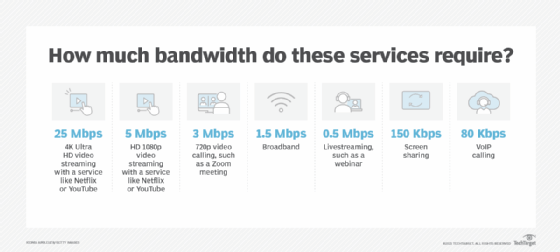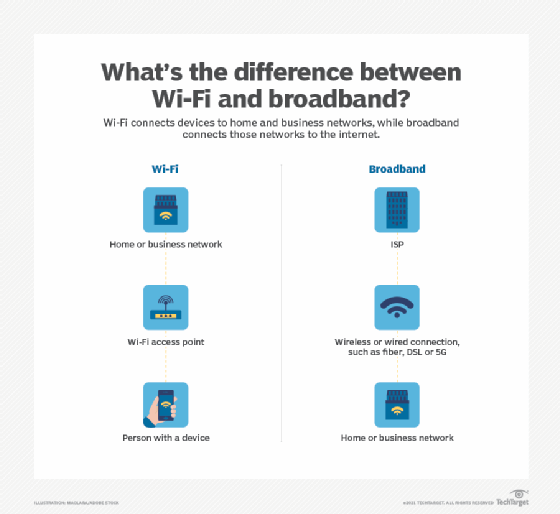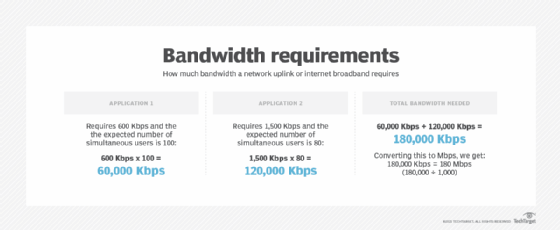internet metering
What is internet metering?
Internet metering is a service model in which an internet service provider (ISP) keeps track of bandwidth use and charges users accordingly. Customers can choose their service package as per their needs, often with a flat rate up to a specified limit. If or when they cross the preset limit, they must pay additional charges, probably per gigabyte (GB) of data downloaded.
The main goal of internet metering is to control heavy bandwidth users and ensure that power users -- i.e., users engaging in bandwidth-heavy activities -- pay more than casual internet users.
Internet metering and traffic shaping -- also known as packet shaping or bandwidth throttling, in which the service provider intentionally slows the connection for some users or applications -- are two approaches to address the problem of ever-increasing demand for a finite bandwidth supply.

How internet metering and data caps work
A data cap, or limit, is the maximum amount of internet data that the ISP determines its users are allowed to use in a specific time period. A data cap is also known as usage allowance or fair use policy. Regardless of what a user does on the internet -- check email, access the cloud, make voice or video calls, or stream video -- they use bandwidth, or data, which counts toward their data cap.
The ISP adds up the data consumed by a user every day to determine the total amount of data used at the end of the billing period, usually a month. Based on usage, the user is then billed at the end of that period. Almost always, the goal of a data cap is to control the free use of the internet by imposing a financial burden on users.
Based on the user's internet plan, the data cap can vary. Some providers offer plans with high caps of 1 terabyte (1,000 GB), while others offer 40 GB or less. Some ISPs don't impose data caps at all, so users can use unlimited or near-unlimited amounts of data for a fixed price. However, in such cases, the ISP usually has a fair use policy or acceptable use policy to prevent abuse of the service.
A metered internet connection simply means a connection with a data cap imposed -- i.e., a connection where all data usage is tracked and billed. Once the data used gets close to the set limit, the ISP usually informs the user. And, once the set threshold is breached, the ISP may block further data transfer or impose additional charges based on data usage.
The case for internet metering
Service providers claim that charging more per unit for heavier internet users makes service fairer for everyone and ensures that all users get access to the internet bandwidth they need. Heavier users are typically those who engage in peer-to-peer file sharing, online multiplayer gaming, watching videos from websites like YouTube, or streaming content -- video or audio -- from over-the-top (OTT) content platforms, like Spotify, Netflix, Hulu or Amazon Prime. Video chatting and smart, internet-connected devices also use more bandwidth than simple email or file applications. For decades now, ISPs have also targeted users of torrent sites, like BitTorrent.
Internet metering is meant to prevent such users from unfairly hogging the available internet bandwidth. Equally important, it also aims to ensure that casual users don't have to pay as much as power users for using a smaller amount of bandwidth.
Further, since customers usually want to avoid paying more, they are more likely to control their own usage, which, in turn, will better ensure that the bandwidth is available in a more equitable and fair manner for all users.

The history of internet metering
In 2008, in the United States, the three largest ISPs at the time announced that they would control customer usage of internet bandwidth through metering. In June 2008, Time Warner Cable began testing internet metering in Beaumont, Texas.
The capped plans offered in Time Warner's test ranged from 5 GB to 40 GB for $30 to $50, with faster service for the more expensive plans. For any additional usage, the charge was $1 per gigabyte.
Comcast also announced its intention to expand its use of bandwidth throttling. The third largest ISP, AT&T, also hinted that it might limit heavy users in the near future.
Setting up self-metering
Users can set metered internet connections on their own in order to track and control their data usage. Once this self-imposed data limit has been reached, the system automatically disconnects from the Wi-Fi or mobile hotspot. This setting is applied to the computer's network adapter.
A self-metered internet connection is most useful in the following circumstances:
- The device is connected to a network with a limited amount of data available.
- A smartphone is used as a hotspot, so another device -- e.g., a laptop -- can connect to the internet.
- The user wants to prevent overage and related overuse fees.
- The user has a limited data plan in another country.
Below is an explanation of the process to set a metered internet connection on Windows computers:
- Go to Settings in the Windows menu.
- Click on Network & Internet.
- Click on Change Connection Properties.
- Under the Metered Connection section, change the setting to On under Set as Metered Connection.
- Change the button back to the Off position to stop metering.

The drawbacks of internet metering
Despite ISPs' claims about the benefits of internet metering, the idea is the subject of considerable debate. Those who oppose it -- especially online content creators, such as video and OTT companies -- believe that internet metering can stifle technological innovation and creativity.
If viewers are worried about a broadband cap, they may think twice about downloading or watching videos or streaming content online, which may cause a drop in demand for this content. This may result in fewer online content developers willing to create new applications.
Another issue is that ISPs generally claim that metered internet service is about conserving bandwidth and about controlling the increasing costs associated with serving more internet customers. Over the past few years, though, networking vendors have been producing devices to increase the available core bandwidth exponentially.
Moreover, due to constant technology innovations, bandwidth is becoming cheaper by the day, which ensures greater availability for a wider range of users, even those using current generation lines. These developments undermine ISPs' arguments about implementing internet metering for bandwidth conservation and cost control.







